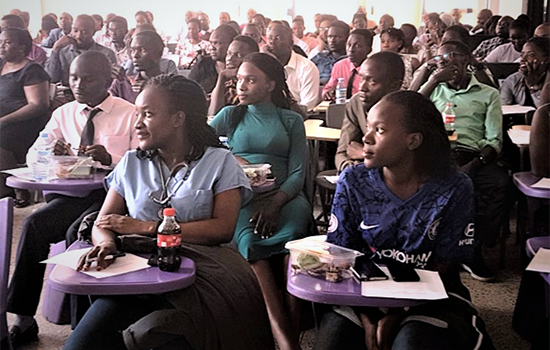
07 Aug Three Questions with Dr. Elsie Kiguli-Malwadde: Focusing on Pre-service Support to Foster Health Workforce Resilience
The African Center for Global Health and Social Transformation (ACHEST) is an independent think tank promoted by a network of African and international leaders in health and development. ACHEST works to build the capacity of institutions and professionals to provide transformational leadership and better the health of Africa’s people.
HRH2030 recognized ACHEST with an honorable mention during its Health Workforce Resilience Prize ceremony in June 2020. ACHEST was acknowledged for its three-day training course that supports newly qualified health professionals in Uganda, as they transition into health service provision. It focuses on building self-confidence, networks, and teamwork, as foundations for fostering resilience.
Dr. Elsie Kiguli-Malwadde is the director of health workforce and  development for ACHEST. She is a radiologist with more than 25 years of experience in medical curriculum development, evaluation, and medical education research at pre-service and postgraduate levels. She has authored more than 70 publications on health professional education and radiology.
development for ACHEST. She is a radiologist with more than 25 years of experience in medical curriculum development, evaluation, and medical education research at pre-service and postgraduate levels. She has authored more than 70 publications on health professional education and radiology.
Question 1: ACHEST has a number of different activities focused on supporting human resources for health and health systems. Why did ACHEST find it important to initiate a pre-service intervention as a way to support health workers?
Induction of interns is an important process, involving planned activities that introduce them to the health system. It enables them to understand how the different parts of the health sector operate and what is expected of them. It provides them with an introduction to government policies and their entitlements and benefits as interns. Trainees say that the induction period is stressful and makes them feel inadequate. It has been noted that this can lead to stress and burnout, mental health problems, and poor patient care. In light of this, ACHEST has come up with a course to address this challenge and help trainees build self-confidence and professional identity, maintain life balance, build connections, handle emotional responses, manage expectations, and facilitate teamwork—all critical in developing professional identity. ACHEST believes that orienting health workers early to aspects of health workforce resilience is the best way to ensure they start work knowing what opportunities or challenges may lay ahead.
In Uganda today, well-trained health professionals go to the job market and may—in both the public and private sector—face major challenges in getting timely recruitment, payroll access, supportive supervision, or obtaining a career path. It therefore becomes critical to prepare them as early as possible to overcome these challenges. Internships make candidates more competitive in the job market. In addition to gaining exposure and experience in the field, it also provides an opportunity to see if their particular career field is the right one for them. However, these benefits can only be achieved if the internship period is well-managed and utilized.
The main purpose of induction training is to assimilate new interns into the health system so they can better understand the systems and procedures of the health sector. Induction training helps interns settle down quickly in their new work environment and gives them a sense of belonging.
A well-performing health workforce is one that works in ways that are responsive, fair, and efficient to achieve the best health outcomes possible, given available resources and circumstances (i.e., there are sufficient staff, fairly distributed; they are competent, responsive, and productive). This can only happen if the newly qualified health professions are provided guidance and informed about what to expect and how to harness the internship period for their benefit and the benefit of the population that they serve.
Question 2: Can you please explain how your training course for students entering the health profession has been effective?
This year was the second time we conducted the course, but it has already been very much sought after by the interns. The course, though voluntary, was oversubscribed. We have only been able to offer the course for a limited number of interns in the central region of the country. However, other interns working from the other parts of the country have inquired as to whether they could also be involved. Last year, as soon as the graduates completed their programs, they were asking when this course would be conducted. This tells us that they have heard from their predecessors that the course is beneficial.
We also conducted an evaluation of the course and the interns rated it highly. The evaluation was excellent: 82.5 percent of those that attended the course agreed that the course was excellent and that the content was relevant to their respective fields. One intern commented, “I learned so much today—I wish every intern would have this course. I am motivated to make the best of my time.”
We have done telephone interviews for those who attended the course and have completed their internship. We are in the process of analyzing the results but generally the responses show that the course was useful.
Question 3: How do you hope your ongoing support to newly qualified health workers will impact the health system moving forward?
We believe that if health workers are well-prepared as they join the workforce, they are more likely to meet their expectations and work smarter. Producing a health workforce that is confident and knows what it takes to succeed, how to avoid stress, or manage their time is the best way to motivate other future workers. We know that this course contributes to an informed and prepared health workforce.
In terms of sustainability, ACHEST is currently working with Ministry of Health so that the ministry will eventually take on the responsibility of administering the course.
Photo: Interns listen to a presentation during the ACHEST-hosted, three-day training course that supports newly qualified health professionals in Uganda. (Credit: ACHEST)





